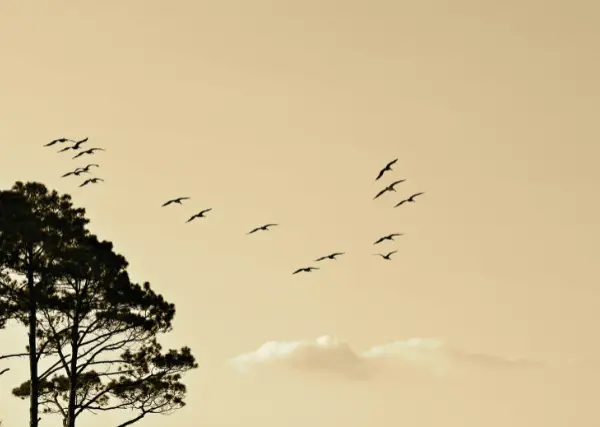Birds are beautiful creatures that bring joy to our surroundings with their chirping and graceful flights. However, there are instances when birds can become a nuisance, especially when they congregate in trees near our homes, gardens, or orchards.
Generally, keeping birds out of trees can be a challenging task. Especially when you have fruits and flowers in the trees which may attract birds.
So, protecting fruit trees and preventing damage caused by birds can be a priority for many. In this article, we will explore effective strategies on how to keep birds out of trees and mitigate potential issues caused by these feathered visitors.
Understanding the Problem
Before diving into solutions, it's essential to identify the specific challenges you face. First, determine which bird species are causing the problem and the extent of their presence in your trees. For example, certain birds, like starlings or pigeons, are notorious for nesting in tree branches and causing damage, while others may be primarily attracted to fruit trees.
Now, let’s delve into the possible solutions for bird control and preventing birds from roosting in trees or flocking around your trees.
How to Keep Birds Out of Trees
Bird Netting
One of the most reliable methods to protect fruit trees from birds is using bird netting. This fine-mesh netting acts as a physical barrier, preventing birds from accessing the branches and feasting on the fruits. Ensure that the netting is properly secured and covers the entire tree canopy for optimal effectiveness.
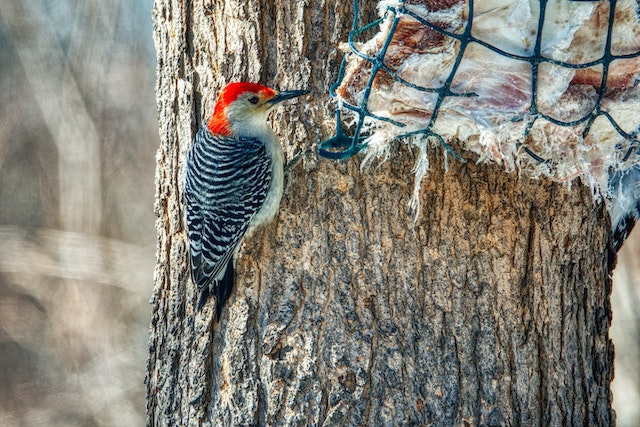
Scare Tactics
Scare birds away from trees by using visual and auditory deterrents. Place reflective objects such as CDs, aluminum foil strips, or windsocks in the branches. The sunlight reflecting off these objects creates an intimidating environment for birds. Additionally, invest in scare devices that emit bird distress calls or predator sounds, reminding the birds of potential dangers.
Natural Predators and Decoys
Birds are instinctively cautious around predators. Utilize decoys, such as owl or hawk replicas, to create the illusion of a threat. Place these decoys strategically in trees to prevent birds from roosting or nesting. Remember to move the decoys periodically to prevent birds from recognizing them as harmless.
An owl decoy is a popular and effective method for deterring birds from trees, gardens, or other areas where their presence may be undesirable. Owls are predators of many bird species, and their presence can intimidate and scare away smaller birds.
Bird Repellent Sprays
Other than the popular ultrasonic bird repellents that deter birds away through sound, bird repellent sprays can be effective in deterring birds from trees.
These sprays typically contain natural ingredients that create an unpleasant taste or smell for birds, encouraging them to seek alternative perching or bird feeder spots. Follow the manufacturer's instructions when applying the spray, and be mindful of potential effects on other plants, fruit trees, and wildlife.
Minimizing Attractants
Birds hang around where they can find food or nesting potential. Discourage birds from frequenting your trees, and minimize factors that attract them in the first place. Avoid placing bird feeders close to the trees you wish to protect, as they can unintentionally draw birds towards those areas.
Keep an eye on water sources that may be attracting birds and address any issues to reduce their presence.
Proper Maintenance
Regularly maintaining your trees can help reduce the appeal for roosting or nesting. Trim tree branches to remove excess perching spots and create a less inviting environment for birds. By keeping trees well-pruned, you can discourage birds from settling in and around them.
Clean Up Droppings
Bird droppings can be unsightly and potentially corrosive to surfaces. To mitigate this issue, clean up droppings promptly using appropriate cleaning methods. Implementing bird deterrent measures can also help minimize the accumulation of droppings on your property.
Physical Barriers
If specific tree branches are problematic, you can install physical barriers like bird spikes or netting to prevent birds from perching or building nests. Ensure that these barriers are installed securely and do not cause harm to the birds.
Remember to approach bird control with humane methods that do not harm the birds. Aim to maintain a balance between human needs and wildlife conservation.
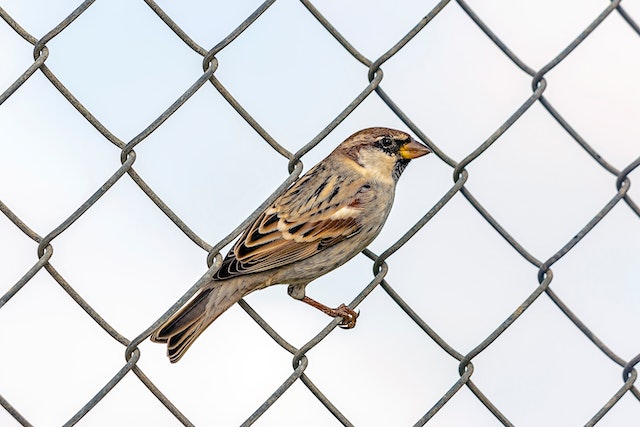
Consider ProperTiming
Consider the timing of your activities. Birds may be more likely to settle in trees during nesting seasons or during specific times of the day when they are actively feeding.
Why Keep Birds Out of Trees
There could be several reasons why you may want to keep nuisance birds out of trees. Here are a few common scenarios.
Fruit and Crop Protection
Birds, especially fruit-eating species, can cause significant damage to crops and orchards. If you have fruit trees or a garden with valuable produce, deterring birds from accessing and feeding on the fruits can help preserve your harvest.
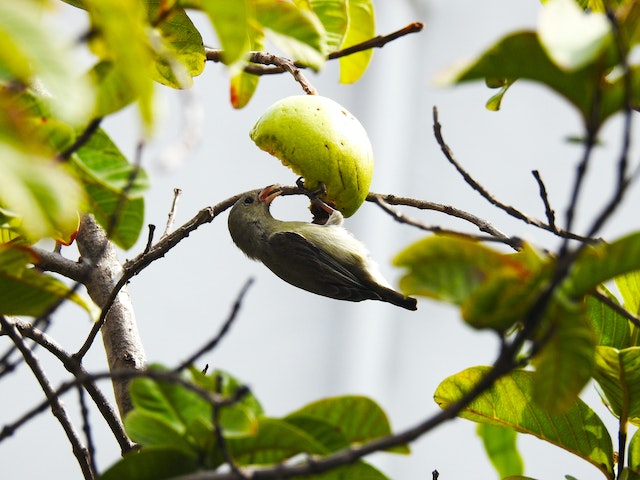
Droppings
Droppings can be messy and potentially corrosive. If birds frequently roost or nest in trees near your property, their droppings can accumulate on walkways, vehicles, buildings, and outdoor furniture. Keeping birds away from trees can help minimize the amount of droppings and reduce cleaning and maintenance efforts.
Nesting Concerns
Some birds, such as pigeons or starlings, can create nests in trees near buildings or structures. These nests can lead to problems like clogged gutters, blocked vents, and damage to the building's exterior. Preventing birds from nesting in trees can help mitigate these issues.
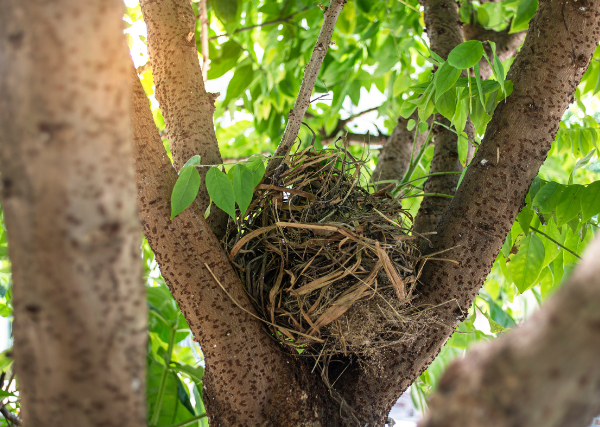
Noise and Disturbance
Bird calls and chirping can be pleasant, but in certain situations, an excessive number of birds in trees near homes or public areas can create noise disturbances, especially early in the morning or late at night. Keeping birds away from these specific areas can help maintain a more peaceful environment.
Health and Safety
In some cases, birds nesting or roosting in trees can pose health and safety risks. For example, the droppings of pest birds can carry diseases, and nesting birds can become territorial and exhibit aggressive behavior, potentially posing a risk to people passing by. Minimizing bird activity in such areas can help reduce these risks.
Remember, while it may be necessary to avoid birds from certain areas, it's equally essential to maintain a balance and respect the natural habitat of birds. When implementing bird deterrent methods, choose humane options that do not harm the birds or disrupt their overall ecosystem.
Conclusion
While birds are an integral part of our ecosystem, there are times when their presence in trees can cause challenges and nuisances. By implementing effective strategies on how to keep birds out of trees you can successfully deter birds from roosting, nesting, or feasting on your fruit trees.
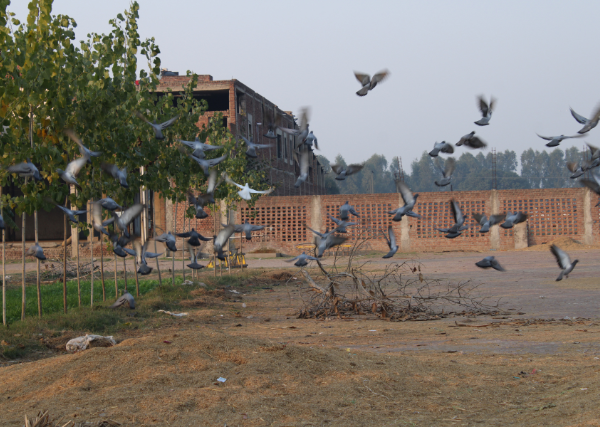
FAQs
How long do I need to keep moving owl decoys?
It is recommended to move owl decoys every few days to prevent birds from habituating to their presence. Changing their location regularly creates the impression of an active predator and maintains their effectiveness.
Can I use bird netting on any type of tree branches to protect fruits?
Yes, bird netting can be used on various types of fruit trees, such as apple, cherry, or citrus trees. Ensure that the netting is properly secured and covers the entire tree canopy to prevent birds from accessing the fruits.
Will hanging shiny objects really prevent birds on trees?
Yes, hanging shiny objects can be effective in discouraging birds from trees. The reflected sunlight creates an intimidating environment for birds, making them less likely to settle in the area.

